
Abstract: After 20 plus years as a sustainability educator, the author had one of those lie-awake-at-night-staring-at-the-ceiling experiences where she faced some hard questions about the state of the world. In this article, describes her subsequent journey investigating the role of listening in shifting to a life-sustaining society and her Ph.D. research into how to support listening across differences to address complex social-ecological challenges.
Continue Reading
Abstract: Ecoliteracy can be defined as an understanding of natural systems and connections between biotic and abiotic factors within sustainable future. Green consumerism is an observable side of ecoliteracy. The aim of this study is, therefore, to examine the long-term effect of environmental education programmes intended for in-service teachers in terms of behavioural change. The teachers were joined ecopedagogy-based education programmes funded by TUBITAK (The Scientific and Technological Research Council of Turkey) in Turkey and were followed up after seven years. The methodology of the study was mixed method within a case study. Quantitative data were collected by a survey and analysed by R statistics. Qualitative data were analysed by content analysis. It was found that the green consumer behaviours of in-service teachers have improved in the long term. However, it is needed more follow up studies within different time frames and country comparison studies in the future.
Continue Reading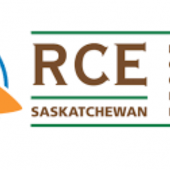
Abstract: Three decades ago Julius Nyerere (1990) wrote Challenge to the South. In response to the legacy of colonialism, Nyerere challenged the nations of the Global South to advance their development and to free their people. These concerns are as relevant today as they were in the 1990s. Established for the United Nations Decade of Education Sustainable Development in 2005, there are now over 175 Regional Centres of Expertise (RCEs) on Education for sustainable Development (ESD). This paper offers a case study of RCEs worldwide with a particular focus on challenges, and responses, including a focus on the select Sustainable Development Goals (SDGs) of poverty and health. Further, an account is given of RCEs which have attended to the recognition of Indigenous and traditional ways of knowing.
Continue ReadingThis editorial overview provides an introduction to this special Journal of Sustainability (JSE) issue devoted to water and climate change, which is being released during United Nations World Water Day 2020. The article contextualizes some of the water security risks that are exacerbated by climate change, such as increasing floods and droughts. This piece further provides a brief overview of the articles in the special water and climate issue of the JSE.
Continue Reading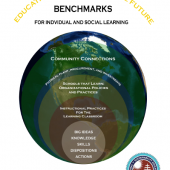
This document is a provisional draft that has emerged out of an initial “State of the Field” issue and database, published in JSE in 2014 and a follow-up conference in Winter of 2015.
Jaimie Cloud of the Cloud Institute has been the lead organizer and author of this document. See the opening pages for the large number of additional contributors.
A process for comment and revision will be announced during Spring/summer 2016.
Continue Reading
Place is more than an environment – it is about the activities, memories, and relationships that are a part of it. It has a history. This essay is about the places that are a part of a relationship and experiences with a family member. It entangles memories of childhood, war, politics, learning, and the simplicity of mountain tops. As this essay examines, the materiality of an environment is much more than mere matter and becomes inseparable from relationship and meaning.
Continue Reading
Too much of education, especially following the Western Enlightenment model and its increased use of scientific, quantifiable metrics, has seemed to completely forget that love and emotional intelligence have everything to do with what and how well the human child learns. In a globalizing society facing shared environmental and social crises of existential proportions, this forgotten understanding is fatal to real hopes of education for sustainability and healthy human and planetary life. Love is simply too critical an emotion to understand and incorporate into education, and it has been too long left out in the cold. But cold it has been for the human mind focusing on only rational/objective and emotion-denying forms of learning and intelligence, creating minds unmoved by the thus un-felt facts of an increasingly globally warming and more confused world.
Continue Reading
The stories we tell shape our view of ourselves and the path we take through this time of collective awakening and global turning. We have the ability to consciously choose narratives that offer realistic beacons of hope to guide our way through the Great Transition. To achieve authentic and lasting reconciliation as the foundation for our future, we require the power of love and compassion as a practical basis for organizing human affairs.
Continue Reading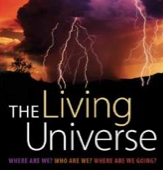
In The Living Universe: Where are We, Who are We, and Where are We Going, Duane Elgin presents a powerfully compelling argument that the most fundamental challenge facing humanity during this time of crisis is to visualize a future of great opportunity and that the foundational story guiding the reality people create on Earth is whether the universe is alive and to be loved and nurtured or dead and to be feared and consumed. This article provides a review of this powerful book with an eye to the connection between love and sustainability.
Continue Reading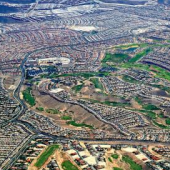
Like sprawl itself, writing about sprawl is scattered in a vast multidisciplinary literature. In this paper we provide a map of what is increasingly known about urban sprawl in emerging literature. This review of progress includes four main parts—definition, data, methods of measurement, and environmental consequences of urban sprawl. The focus of this literature review is to determine whether the aforementioned parts are elements of a connected system in which progress in any one part reflects in others, thereby enhancing knowledge of urban sprawl’s environmental consequences through a cross-fertilization with progress in how sprawl is defined, data are used, and phenomena are measured. We conclude with a discussion of areas of further research that surmounts the shortcomings of a disconnected, epistemic (knowledge) system of definitions, data, and methods, and points toward an explanation of urban sprawl’s environmental consequences. The implications for the education of urban sustainability are noted.
Continue Reading
As sustainability educators and communication professionals consider various strategies to engage audiences with regard to household energy use, one option now seemingly available is to leverage social networks by encouraging people to share information with others they know. At the same time, we currently do not know enough about the potential spread of energy-related information in this fashion. Whether, when, or how people share energy-related information with peers or family members are crucial questions, for example. Using national survey data from U.S. residents (n=816), we predicted energy information sharing as a function of objective energy knowledge (measured using a factual energy knowledge index), perceived energy understanding, and demographic variables. Our analyses underscored the importance of assessing not only factual energy knowledge but also perceived understanding, as both are equally predictive of energy information sharing frequency (β=.11, p<.05, for objective knowledge and β=.11, p<.01 for perceived understanding). Number of children also predicted energy information sharing, β=.11, p<.01. We discuss the implications of these results for informal energy education efforts in the 21st century.
Continue Reading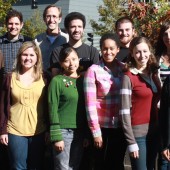
This article discusses the evolution and work of Brown University’s Climate and Development Lab (CDL). As leaders of the CDL, we engaged students in experiential education while attending the United Nations climate change negotiations in Cancun, Mexico in 2010, and in Durban, South Africa in 2011. Simultaneously, we collaborated with students to provide relevant and timely research and public scholarship oriented by the goal of advancing global justice in international climate change policy. Here we offer a conceptualization of our pedagogy for the CDL, which is a synthesis of two guiding principles: ‘engaged education’ and ‘global just sustainability’. We discuss the ways in which we organized the CDL in relation to this pedagogy and everyday logistics, and reflect upon our accomplishments and the challenges that we faced. We argue that while there are areas where we can improve upon our practice, the potential of this type of learning is considerable, and can be complementary to producing scholarly outputs that contribute to a more just and sustainable world.
Continue Reading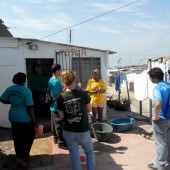
It is widely acknowledged that the sustainability challenges facing the world require new approaches to teaching and learning. At the community level, however, sustainability priorities are context specific, so prescriptions of what and how to teach for sustainability are limiting. In higher education, one innovative approach to sustainability education that acknowledges the limits of conventional coursework involves courses based on “shared action learning” – a process in which students, faculty, and community sponsors share learning experiences while working on sustainability projects for a specific community. Shared Action Learning can be applied in any community context near or far from campus ranging from the very local campus community to distant settlements across the globe. This paper describes the processes, opportunities and challenges of shared action learning through five stages: (1) project impetus, (2) contextual research and project planning, (3) community engagement and project refinement, (4) action, and (5) reflection and reporting. The roles of students, faculty, sponsors, and communities throughout the semester-long shared action learning project are explored through two examples – a course at Clark University in Worcester, MA that focuses on SAL within the college campus community and a Worcester Polytechnic Institute program through which students work on projects with partners in informal settlements in Cape Town, South Africa.
Continue Reading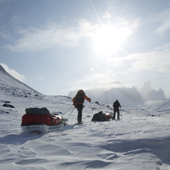
Adventure has been incorporated into sustainability education in a variety of ways, including through outdoor education and, more recently, through technology-enhanced learning. Technology has, for example, expanded opportunities for experiential learning through adventure as well as allowing learners to journey virtually along with explorers and scientists to the far-reaches of the world. This paper offers an overview of how adventure has traditionally been employed in both formal and informal education, discusses the differences between adventure education and adventure learning, shares research conducted on the role of adventure in the GoNorth! Adventure Learning Series, and advances suggestions for how adventure might be employed in sustainability education using distance, online, and mobile learning. The researchers propose the user-driven adventure learning environment (UDALE) as one model that educators and designers can draw from in both formal and informal learning settings as a means to fuse adventure, technology, and sustainability education in a pedagogically meaningful way.
Continue Reading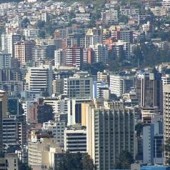
Two developing strands of a multidisciplinary literature provided an impetus for this paper: 1) the emergence of new regionalism, new urbanism, and smart codes that inform urban planning and design principles and practices for environmental sustainability, and 2) the diffusion of telecommunication and multi-media technologies that facilitate implementation of pedagogic principles in the “classroom.” The emerging urban planning and design paradigms anchor environmental sustainability issues firmly in place and space with an emphasis on the physical form of cities and regions, which, due to induced vehicular travel, is linked to greenhouse gases with consequences for climate change. Innovations that enhance learning in the classroom or the community increasingly embed and diffuse telecommunication and multimedia technologies. The intersections of urban sustainability, planning, pedagogy, and technology are briefly reviewed in this paper. It turns out that urban planning and design paradigms—particularly those with an emphasis on systemic knowledge, holistic views of both the natural and built environments, collaboration, communication, and reflective practice—synergize with environmental sustainability goals. Furthermore, these very features are ingredients for effective education for urban sustainability, particularly in conjunction with advanced telecommunication and multimedia technologies.
Continue Reading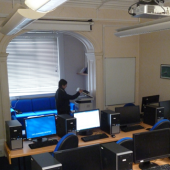
This study investigated the current energy use perceptions and practices of staff and students within five buildings at the University of Sheffield, UK. A series of focus groups with staff and post-graduate representatives from these buildings explored occupant awareness of energy consumption, perceived level of control over energy use, priorities for reduction and the perceived facilitators and barriers to reduction. Overall, personal awareness and attitudes about the need to conserve energy, the perceived actions and opinions of other users (including University authorities) and perceptions of control over the ease and opportunity to reduce energy consumption were perceived by occupants to relate to whether they would intend to conserve energy in University buildings. Recommendations for encouraging energy conservation focus on engendering greater occupant responsibility for conservation by providing a clear conservation message, participating in energy reduction schemes and providing greater energy usage information. Few papers have investigated occupant understanding of energy use in UK University and Higher Education buildings, despite large reduction targets in the sector. This paper recognises the importance that staff and student engagement will have in the successful achievement of these targets and explores their insights and perceptions.
Continue Reading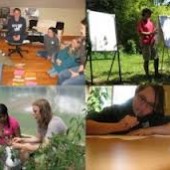
To live up to UNESCO’s definition of a sustainable development education that empowers youth with the knowledge, attitudes, motivations, commitments, and skills to solve and prevent the world’s total environmental problems, youth must be able to find meaning in the curriculum based in their own experiences and expanded through shared group experiences. An environmental-based experiential curriculum with a positive development focus can help youth reclaim their learning process and reconnect with their communities. However, without critical analysis, students, especially marginalized students, cannot develop the tools and competencies to truly understand their environment and their place within it. Linking environmental and experiential education with critical theory provides students the opportunity to develop their leadership and gain the social and cultural literacy skills needed to come in from the margins.
Continue Reading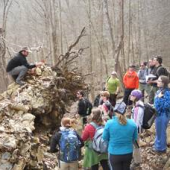
In this article I articulate what it means to understand curriculum as bioregional text. I utilize a theoretical mode of inquiry to explicate the values of bioregional education while integrating the discussion into the reconceptualized field of Curriculum Studies. The discussion addresses the value of direct experience, in our bioregion, and explains the significant contribution that can be drawn from developing a clearer understanding of our bioregional autobiography.
Continue Reading
This report describes a unique technique for presenting an introduction to sustainability science course that is both required for sustainability science majors at a large Mid-Atlantic state university and a general education non-laboratory science course. The World Scientists’ Warning to Humanity, released by the Union of Concerned Scientists in the late 1990s, serves and an indictment of humanity. The course mimics a trial as it proceeds from the indictment through an arraignment, pre-trial, trial, verdict, and sentencing with students acting both as the accused and the jury.
Continue Reading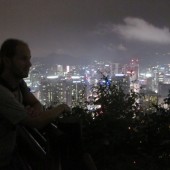
The field study (or short-term study abroad) creates a successful hybrid of study abroad and field research. These short-term educational adventures (edu-ventures) give environmental or sustainability students opportunities to gain practical knowledge while traveling domestically or overseas. In addition, it presents the opportunity for both faculty and students to extend the traditional Boyer model of scholarship, a reputable professoriate model, by developing continuity. The field study fulfills the four pedagogical goals of the Boyer model: creating research opportunities (discovery); breaking down the silos of traditional academic departments (integration); acting as consultants on-site (application); and educating students beyond the faculty members’ expertise (teaching). In addition, these field studies fulfill a fifth goal: building relationships and transgressing time (continuity). The development of this Boyer Plus model from a field-study experience serves as a tremendous tool for colleges, universities and professors to build the opportunities and necessary pedagogical skills for both traditional and non-traditional students.
Continue Reading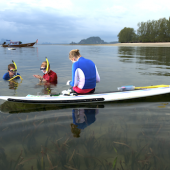
Understanding how we live (culture) and its impact on where we live (ecology) is one of the key issues facing sustainability and sustainability education. The International Sustainable Development Studies has developed a study abroad program for American college and university students in Thailand, “People, Ecology and Development” to address these issues through experiential studies of sustainability. Courses each semester focus on understanding the broader challenges of sustainable development through experiential studies of specific landscapes and cultures in the villages, mountains, coasts and islands throughout Thailand. This paper examines the key components of ISDSI’s programs, and provides a framework for understanding how these principles can be used to teach about sustainability within the broader context of issues of social justice and global learning more generally. Key components of the ISDSI approach include: community based learning — working with local communities to design courses that reflect community needs, knowledge and struggles; place-based learning — examining both the culture and ecology of specific locations, watersheds, bioregions, island archipelagos, etc.; experiential learning — learning through direct examination of and participation in the cultural practices (lifeways, norms, etc.) and study of ecological components (forests, coral reefs, etc.); and expedition based — learning during focused expeditions through the landscapes being studied, usually human powered (backpacking through remote mountain forests, sea kayaking between islands, etc.).
Continue Reading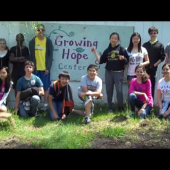
This article presents a case study of a middle school project based on the experience of two teachers and an administrator. The project gives 8th grade students an opportunity to make a difference in the world through a Sustainability Action Project. In this article you will read the rationale behind this project. You will get an overview of and a timeline for its implementation over the course of a complete academic year. We will provide you with some examples of projects as well as refer you to our school webpage where you can view these projects in more detail. Finally, we have included appendices of several of the materials we provide to our students. We hope that you will clearly see what sets this learning experience apart from other sustainability projects, and that you will be able to adopt a similar project in your school.
Continue Reading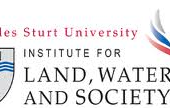
PDF: Rafferty and Laird, Spring 2013 Abstract: This paper explores the observations and perceptions of school children as they engage with nature through place based environmental experiences. The paper reports on two projects, one based in the USA and the other in Australia, designed to promote understanding of sustainability through outdoor […]
Continue Reading
In a very cohesive and convincing argument, Randall Amster asks us to look at the other side of the well-worn coin that links environmental degradation and resource despoliation to conflict and war. Instead, argues Amster, conflict zones have been shown to be appropriate sites for the creation of peace parks and other similar initiatives, where they can be turned into regions of enhanced sustainability—in every sense of the word, including environmental, social, and economic.
Continue Reading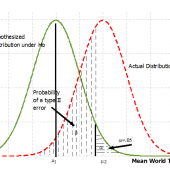
Dave Tomkins and Panagiotis Tsigaris focus their fine analytical stats skills on how to not to make the wrong kind of error…yes, that should be the right logic…regarding global warming. They elegantly lay out the math behind what we all know intuitively…nothing is to be lost from taking precautions regarding global warming, or avoiding Type II statistical error, which comes, not from assuming that humans caused global warming, even when we didn’t, but rather being unable to prove that humans cause global warming, when in fact we are causing it. They present the statistics in the context of a course case study and make it clear that we have no reason to wait on the data since the potential for this type of error is already with us and the actions to be taken are probably beneficial in other areas as well.
Continue Reading
Sponsoring the Journal of Sustainability Education The Journal of Sustainability Education is actively seeking partners, sponsors, and donors to collaborate on moving the field of sustainability education outward and deeper. The Journal is a premiere publication with dynamic content: a blend of peer reviewed and timely interviews and media pieces that draws 700,000 web views per year. […]
Continue Reading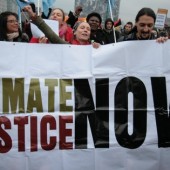
In this insightful review of Brian Tokar’s book, Randall Amster hails the work as a hopeful response to climate change that, rather than playing off of apocalyptic scenarios, envisions a future where society is re-structured not only in technological and economical terms, but also towards a more socially equitable way of life.
Continue Reading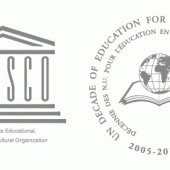
The Education for Sustainable Development (ESD) community, argues Robert Bray, is shy to confront controversy. In this quick review of three controversial issues—population control, the role of science, and limits to growth—he quickly points out how important it is to embrace controversy as a way to arrive at sound policy.
Continue Reading